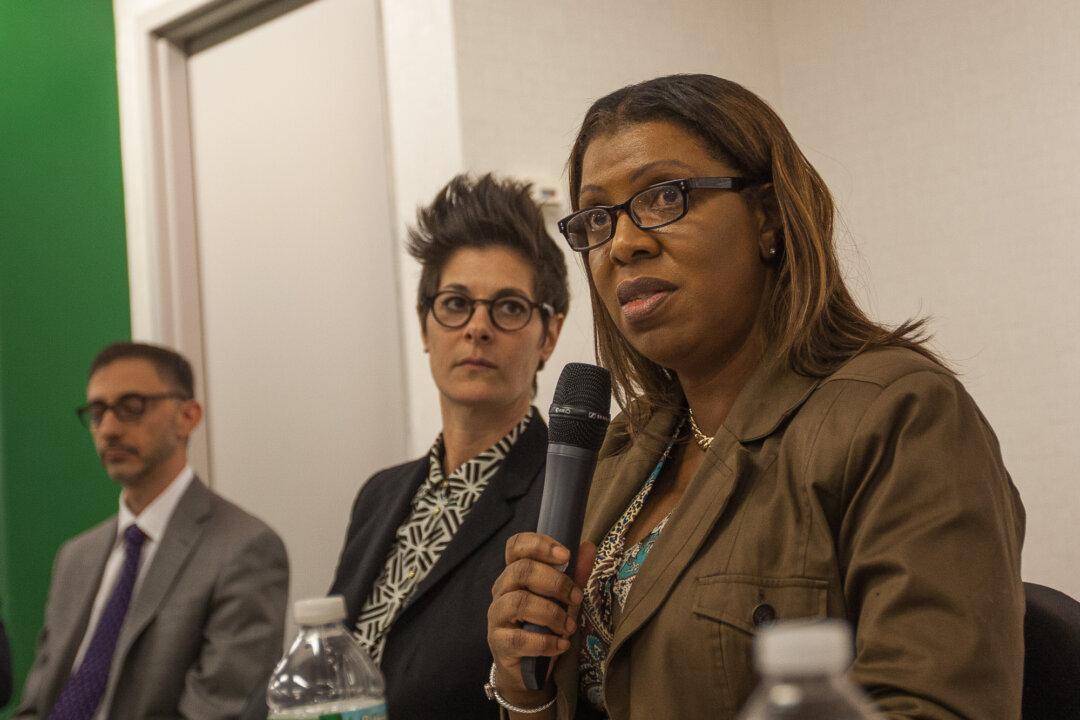NEW YORK—New York City Public Advocate Letitia James is “best, best friends” with Mayor Bill de Blasio, said lawyer Arthur Schwartz during a Saturday town hall meeting.
“Let’s not go that far,” James replied.
In her first departure from the mayor’s agenda since becoming the public advocate, James said she will go forward with a lawsuit against some 45 school co-locations approved by the Bloomberg administration. De Blasio promised to review the co-locations and on Feb. 27 gave a green light to most. Nine of the co-locations were canceled, one was reduced, and three are still under review.
Co-location is the practice of moving a school into a building where another school already operates. The practice was frequently used by the Bloomberg administration. De Blasio called the process “abhorrent” during his campaign.
James said previously she would delay litigation of co-locations under review by the de Blasio administration. After the results of the review were announced, she held a town hall meeting Saturday with parent representatives from across the city.
Hearing their pleas she decided to resume the lawsuit. “We’re moving forward with the litigation,” she said. “The mayor, unfortunately, did not engage parents. They were all here today, you heard their voices.”
Three parent organizations and five city council members filed the lawsuit on Dec. 27 last year. Among them was Melissa Mark-Viverito, now council speaker, and James, who was at that time a council member and public advocate-elect.
The lawsuit says the administration approved the co-locations against the wishes of local communities, and thus “followed the formalities required by the state education law, but ignored the spirit and the intent of the law.”
“Sometime in the next two weeks we will be in a courtroom,” said Schwartz, the lawyer representing the plaintiffs and member of Advocates for Justice, a nonprofit set “to fight for the rights of the poor and the rights of working people,” according to its website. He offered his services for the case pro bono.
The lawsuit aims to give more power to Community Education Councils, which are elected parent bodies representing each school district. According to James, the councils should have influence on whether a co-location in a district can go through.
Parents’ Demands
The parents at the town hall meeting also demanded that the method of measuring the impact the co-locations on existing schools be improved. The parents shared a multitude of examples of co-location repercussions, from children confused by the multiple sets of rules different schools impose in a single building, to students having classes in trailers to allow for another school to move into their building.
Parents also demanded delay of co-locations until the manual for assessing available class space in a school building is improved. Schools Chancellor Carmen Fariña set up a task force to review the manual, called the “Blue Book,” as it was criticized for overstating available space and converting art classes, science labs, and libraries into classes for new schools.
“If you speak with any parent he or she will tell you that the ‘Blue Book’ is a joke,” said Mona Davids, president of the New York City Parents Union, one of the plaintiffs. “The ‘Blue Book’ would call a janitors closet a classroom.”
So far the task force has had one meeting and has not reached any conclusions.
Time is a concern, because once students are enrolled into the co-located schools, it may not be possible to reverse them. Schwartz said he will ask the court to postpone the deadline for charter school admissions, as 14 of the contested co-locations give new space to charter schools and the deadline for admissions is in April.





